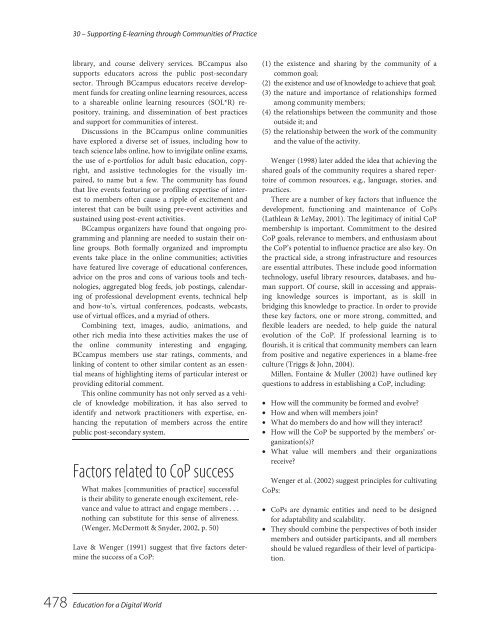Education for a Digital World Advice, Guidelines and Effective Practice from Around Globe, 2008a
Education for a Digital World Advice, Guidelines and Effective Practice from Around Globe, 2008a
Education for a Digital World Advice, Guidelines and Effective Practice from Around Globe, 2008a
You also want an ePaper? Increase the reach of your titles
YUMPU automatically turns print PDFs into web optimized ePapers that Google loves.
30 – Supporting E-learning through Communities of <strong>Practice</strong><br />
library, <strong>and</strong> course delivery services. BCcampus also<br />
supports educators across the public post-secondary<br />
sector. Through BCcampus educators receive development<br />
funds <strong>for</strong> creating online learning resources, access<br />
to a shareable online learning resources (SOL*R) repository,<br />
training, <strong>and</strong> dissemination of best practices<br />
<strong>and</strong> support <strong>for</strong> communities of interest.<br />
Discussions in the BCcampus online communities<br />
have explored a diverse set of issues, including how to<br />
teach science labs online, how to invigilate online exams,<br />
the use of e-portfolios <strong>for</strong> adult basic education, copyright,<br />
<strong>and</strong> assistive technologies <strong>for</strong> the visually impaired,<br />
to name but a few. The community has found<br />
that live events featuring or profiling expertise of interest<br />
to members often cause a ripple of excitement <strong>and</strong><br />
interest that can be built using pre-event activities <strong>and</strong><br />
sustained using post-event activities.<br />
BCcampus organizers have found that ongoing programming<br />
<strong>and</strong> planning are needed to sustain their online<br />
groups. Both <strong>for</strong>mally organized <strong>and</strong> impromptu<br />
events take place in the online communities; activities<br />
have featured live coverage of educational conferences,<br />
advice on the pros <strong>and</strong> cons of various tools <strong>and</strong> technologies,<br />
aggregated blog feeds, job postings, calendaring<br />
of professional development events, technical help<br />
<strong>and</strong> how-to’s, virtual conferences, podcasts, webcasts,<br />
use of virtual offices, <strong>and</strong> a myriad of others.<br />
Combining text, images, audio, animations, <strong>and</strong><br />
other rich media into these activities makes the use of<br />
the online community interesting <strong>and</strong> engaging.<br />
BCcampus members use star ratings, comments, <strong>and</strong><br />
linking of content to other similar content as an essential<br />
means of highlighting items of particular interest or<br />
providing editorial comment.<br />
This online community has not only served as a vehicle<br />
of knowledge mobilization, it has also served to<br />
identify <strong>and</strong> network practitioners with expertise, enhancing<br />
the reputation of members across the entire<br />
public post-secondary system.<br />
Factors related to CoP success<br />
What makes [communities of practice] successful<br />
is their ability to generate enough excitement, relevance<br />
<strong>and</strong> value to attract <strong>and</strong> engage members . . .<br />
nothing can substitute <strong>for</strong> this sense of aliveness.<br />
(Wenger, McDermott & Snyder, 2002, p. 50)<br />
Lave & Wenger (1991) suggest that five factors determine<br />
the success of a CoP:<br />
(1) the existence <strong>and</strong> sharing by the community of a<br />
common goal;<br />
(2) the existence <strong>and</strong> use of knowledge to achieve that goal;<br />
(3) the nature <strong>and</strong> importance of relationships <strong>for</strong>med<br />
among community members;<br />
(4) the relationships between the community <strong>and</strong> those<br />
outside it; <strong>and</strong><br />
(5) the relationship between the work of the community<br />
<strong>and</strong> the value of the activity.<br />
Wenger (1998) later added the idea that achieving the<br />
shared goals of the community requires a shared repertoire<br />
of common resources, e.g., language, stories, <strong>and</strong><br />
practices.<br />
There are a number of key factors that influence the<br />
development, functioning <strong>and</strong> maintenance of CoPs<br />
(Lathlean & LeMay, 2001). The legitimacy of initial CoP<br />
membership is important. Commitment to the desired<br />
CoP goals, relevance to members, <strong>and</strong> enthusiasm about<br />
the CoP’s potential to influence practice are also key. On<br />
the practical side, a strong infrastructure <strong>and</strong> resources<br />
are essential attributes. These include good in<strong>for</strong>mation<br />
technology, useful library resources, databases, <strong>and</strong> human<br />
support. Of course, skill in accessing <strong>and</strong> appraising<br />
knowledge sources is important, as is skill in<br />
bridging this knowledge to practice. In order to provide<br />
these key factors, one or more strong, committed, <strong>and</strong><br />
flexible leaders are needed, to help guide the natural<br />
evolution of the CoP. If professional learning is to<br />
flourish, it is critical that community members can learn<br />
<strong>from</strong> positive <strong>and</strong> negative experiences in a blame-free<br />
culture (Triggs & John, 2004).<br />
Millen, Fontaine & Muller (2002) have outlined key<br />
questions to address in establishing a CoP, including:<br />
• How will the community be <strong>for</strong>med <strong>and</strong> evolve?<br />
• How <strong>and</strong> when will members join?<br />
• What do members do <strong>and</strong> how will they interact?<br />
• How will the CoP be supported by the members’ organization(s)?<br />
• What value will members <strong>and</strong> their organizations<br />
receive?<br />
Wenger et al. (2002) suggest principles <strong>for</strong> cultivating<br />
CoPs:<br />
• CoPs are dynamic entities <strong>and</strong> need to be designed<br />
<strong>for</strong> adaptability <strong>and</strong> scalability.<br />
• They should combine the perspectives of both insider<br />
members <strong>and</strong> outsider participants, <strong>and</strong> all members<br />
should be valued regardless of their level of participation.<br />
478 <strong>Education</strong> <strong>for</strong> a <strong>Digital</strong> <strong>World</strong>


















